Guest post by Meyo Zongo and Patu Ndango Fen, 2017 fellows of Cameroon
Editor’s note: The 2017 fellows of Cameroon were one of five country cohorts to receive a $3,000 seed grant to support the implementation of their action plan that was developed during the 2017 TechWomen program. In addition to mentorship and cultural activities, TechWomen participants collaboratively work to develop an action plan to address a socioeconomic issue in their community alongside Impact Coaches.
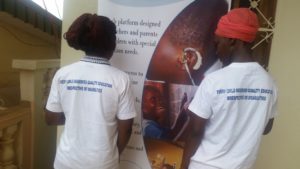 During the five weeks of the TechWomen program in 2017, the Cameroonian team was comprised of young, dynamic ladies representing different fields of work such as research, social entrepreneurship, engineering and education. While working together on our impact plan, we decided on developing a project that would train teachers to adopt inclusive teaching and learning techniques [Editor’s note: view Team Cameroon’s action plan pitch from the 2017 TechWomen program]. Our project, Able Too, is an interactive online platform with unlimited online resources that will equip teachers to better serve children with special educational needs. This platform will also be accessible to the parents and tutors of these children, who are responsible for complementing their education at home.
During the five weeks of the TechWomen program in 2017, the Cameroonian team was comprised of young, dynamic ladies representing different fields of work such as research, social entrepreneurship, engineering and education. While working together on our impact plan, we decided on developing a project that would train teachers to adopt inclusive teaching and learning techniques [Editor’s note: view Team Cameroon’s action plan pitch from the 2017 TechWomen program]. Our project, Able Too, is an interactive online platform with unlimited online resources that will equip teachers to better serve children with special educational needs. This platform will also be accessible to the parents and tutors of these children, who are responsible for complementing their education at home.
Program Development
After several online and in-person meetings, we were able to complete the development of the online platform, which is currently operational with continuous efforts being put in place to improve on it.
The successful implementation of this project would not have been possible without the diligent involvement of our volunteers, who have been of great help assisting us in promoting our platform via various social media platforms, as well as going into the field to collect important information. They helped us identify potential partner schools and experts, and we have now established partnerships with schools and experts in the field of inclusive education. We have also already signed several partnerships with other projects closely related to Able Too, such as the Hope Inclusive Foundation, an inclusive teacher training center in Yaoundé and a project conducted by a group of game developers from the Netherlands.
In order to promote our project, we designed various promotional materials such as flyers, t-shirts and banners. We equally made use of our various social media platforms, where we regularly posted updates about the project.
Launch
Tassah Academic Complex served as our pilot school and is where we held the official launch of Able Too. Following several meetings with the school’s coordinator, experts and teachers, we were effectively able to launch our project on June 26, 2018. The launch was geared toward presenting the project to the teachers and showing them the necessity of becoming inclusive teachers. This was an intensive day of work marked by highly interactive sessions and presentations about inclusive education. We had teachers representing four different schools with more than 70% being teachers from the host institution.
Throughout the day, we presented teachers with practical techniques and strategies to better lead an inclusive class and bring out the creativity in each child irrespective of their differences. For example, we taught them how to manage hyperactive children by giving them more creative exercises to do, incentivizing lessons by providing prizes, such as candies, balloons and writing materials. We also discussed making use of learning games to enhance children’s learning capacities instead of trying to force a standard system of learning that is not adapted to children with disabilities. Teachers were given the opportunity to share their experiences and realities on the ground. We were collectively able to come out with some recommendations and solutions that will be essential in the years to come to improve the content of our platform.
About the Team

Team Cameroon from left to right: Beatrice Nguimkeng, Patu Ndango Fen, Meyo Zongo, Danielle Akini and Mpara Faith.
Meyo Zongo is an Assistant Lecturer and a researcher in the Faculty of Science at the University of Ngaoundere, Cameroon. She is currently the first female teacher in the Department of Mathematics and Computer Science, and she works extensively with young girls in Ngaoundere.
Patu Ndango Fen is a social entrepreneur and founder of Closed-Loop System Ventures, which deals with the valorization of waste into economically viable products. She belongs to several development associations and enjoys carrying out community work.
Danielle Akini is the CEO & Founder of Genius Centers. Tech, gender equality, kids empowerment, diversity, education – this is Danielle’s world! Danielle has more than seven years of experience in hardware development and education.
Mpara Faith is the Co-Founder and Operations Manager of New Generation Technologies (NGT), a start-up company in Buea, in the South-West Region of Cameroon. She has been the manager of this company for two years. She was named one of the 50 most influential young Cameroonians for 2017.
Beatrice Nguimkeng heads the Quality Control and Reporting Department of Eneo Cameroon. She is also the Founder of ETIC Cameroon, a non-profit that caters to the educational needs of autistic children in Cameroon.

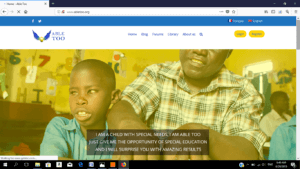
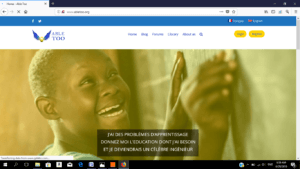
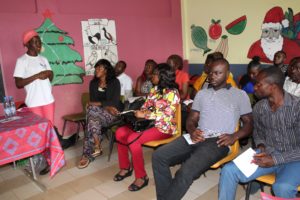
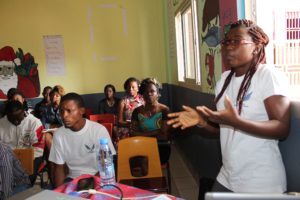
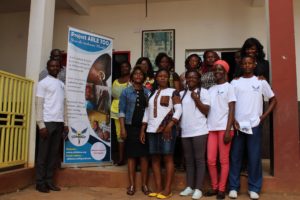

Speak Your Mind